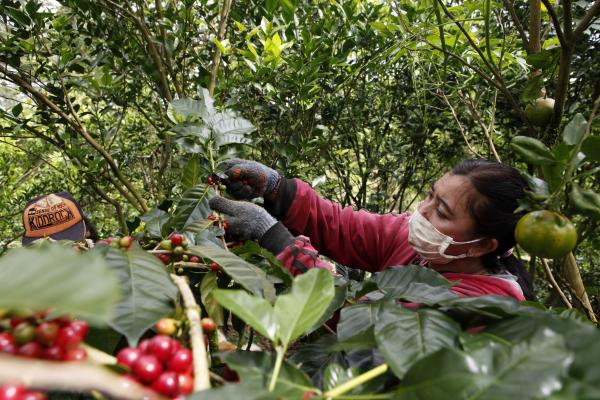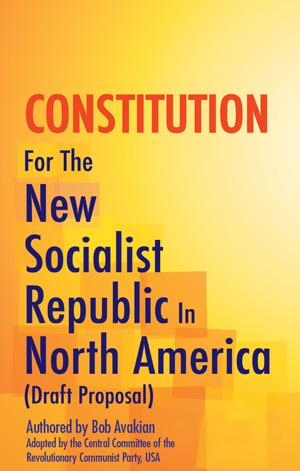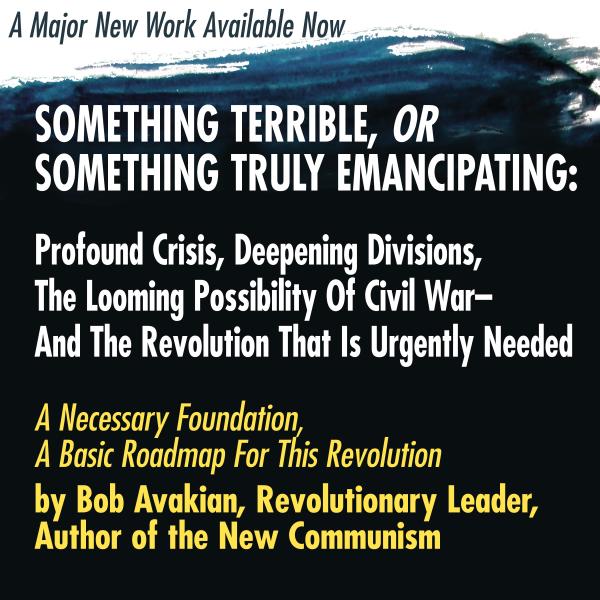Exhibit A: The Food System
COULD a socialist society, basing itself on the new communism and the Constitution for the New Socialist Republic in North America, restructure the economy on an ecologically sustainable basis, in ways that break its dependence on fossil fuels? Yes. This is gone into in depth in the Constitution for the New Socialist Republic in North America, written by Bob Avakian, and in "Some Key Principles of Socialist Sustainable Development." Here we will briefly explore just one extremely important example: the food system.
First, let’s look at how food is produced today, under capitalism-imperialism. Under this system, food production is a major contributor to climate change—it is globalized, heavily fossil fuel dependent, and a major source of methane (a greenhouse gas that is 70 times more potent in the short run than carbon dioxide). The way food is grown rests on and reinforces the profound inequalities in the world—oppressed nations around the world have had their traditional agriculture gutted and have become places to produce specialized crops for the imperialist countries.
Where food is grown, and how it is grown, is determined by one factor above all else: profit for highly concentrated imperialist capital. If it is cheaper for companies in the United States to import some food product grown in, say, Indonesia—because agricultural labor there can be more intensely exploited, there are less environmental regulations restricting the use of toxic agrochemical inputs and overall agricultural practices, the soil and climate is more favorable, and trade restrictions or tariffs are not prohibitively expensive—then that’s what will happen.
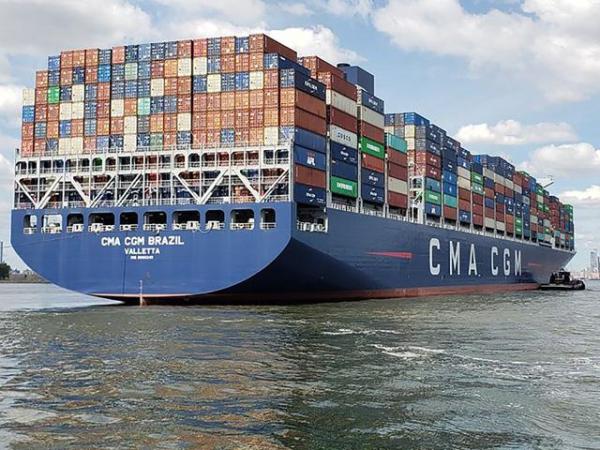
Our current system of agricultural distribution is dependent on exploitive and fossil fuel burning international supply chains. About 90 per cent of the world’s trade is transported by ship, like this container transporter. Photo: U.S Army Corps of Engineers
Capitalism-imperialism is NOT governed by: the impact that agricultural production for export has on the Indonesian people and economy; the irreversible environmental damage done by cutting down rainforests which are homes for all kinds of plants and animals; the poisoning of people and the environment by the use of pesticides and fertilizers that promise higher yields in the short run; nor the further acceleration of climate change by massive burning of high-polluting oil to ship food halfway across the world. Nothing else is taken into account by this system but its organizing principle of production for profit, and this takes raw and brutal expression in the global South.
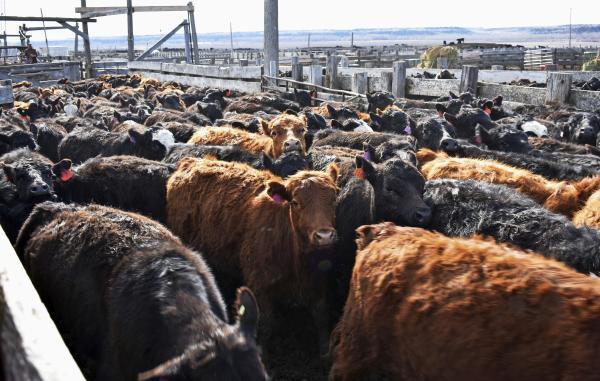
Under this system, the goal is what is most profitable for multi-billion dollar concentrations of capital. This dictates building massive factory-farms and slaughterhouses which mistreat both the people and the animals, like at this Montana cattle ranch. Photo: AP
And in the imperialist countries themselves, agriculture is also dominated and controlled by what is profitable for multi-billion dollar concentrations of capital. That means: building massive factory-farms and slaughterhouses which mistreat both the people who are exploited in them, mainly immigrants driven from their lands in the global South by poverty, war and climate change, and the animals for slaughter; widespread use of pesticides, fertilizers, and other methods which damage the environment, spread harmful chemicals in the food, and exploit the people who do the work in the fields and farms, many of whom face intense oppression and discrimination.
Let’s look at agriculture in two different futures. One, in which there is no revolution, and all of what was touched on in the above paragraphs continues for decades. And a second, in which there is a revolution in what is now the USA.
First, a world in which capitalism-imperialism reigns for decades, the underlying framework continues to intensify climate change, and the horrifying inequalities and oppression already built into the system get even worse. Take water, essential to agriculture, and to human beings. The IPCC report projects that for every increase in warming by 0.1 degree Celsius—from 1.5 to 1.6 to 1.7 degrees, etc.—there will be a corresponding intensifying water crisis. A projected 800 million to 3 billion people at 2°C warming are projected to not have access to enough water, this means not enough to drink and not enough to produce food to eat. This on top of what is already a world of mass hunger and starvation.
Enough said about this future—Time’s Up for this System!
Now, let’s imagine a different world, after the revolution... How would food production, distribution and consumption be organized under socialism? Here it is only possible to discuss, in broad strokes, what would both become possible AND what would at the same time necessitate serious struggle and involve complex contradictions. What’s important to emphasize is that revolution, and the new, socialist state power, would open up the tremendous possibility to forge a rational, consciously planned, healthy for humans, and ecologically sustainable food system in ways that are simply NOT possible under THIS system, and would contribute to the overall effort in socialist society to massively reduce the injection of greenhouse gases into the atmosphere. Given the disproportionate role of the U.S., this would not only be a giant step in its own right, but an example for the entire planet, impacting and inspiring people around the world with the possibility and viability of a radically different society through Revolution.
How would the revolution make these changes?
As a start, the giant multinational corporations that currently control our food system would be put out of business, their assets seized, and their exploitation ended. Profit would no longer be what governs how, what and where food is produced, distributed, and consumed. No more would oppressed countries’ agriculture be organized to produce goods for imperialist countries. The dependence on exploitive and fossil-fuel-burning international supply chains would be phased out as quickly as possible. No more poisoning lakes and rivers with fertilizer made with heavy reliance on fossil fuels. The new socialist state would put an end to all of that, would marshal and synthesize the knowledge of scientists, farmers, practices of certain indigenous communities—and would set about building a new and radically different system to supply food to the people.
But none of this would be easy—and would involve complex contradictions and struggle. And all of this would have to involve both leadership and planning from the state, AND conscious initiative from people throughout society. It would not be implemented top-down, but via the process Bob Avakian has characterized in The New Communism as “solid core with a lot of elasticity,” and would involve tremendous debate, discussion, and all kinds of mass initiative. Rather than a culture of individualistic atomized zombies which this society fosters and enforces, a revolutionary culture in which people’s conscious initiative to tackle and solve the biggest questions facing humanity—including how we can feed the people while we undo the environmental catastrophe that capitalism-imperialism has created—would be unleashed and encouraged throughout society.
People would be encouraged—and where needed, struggled with—to change their diets and lives to match this ecologically sustainable system of agriculture. Domestic agriculture would become the basis of the nation’s food system. Both urban and rural agriculture, as well as both large-scale and smaller-scale farming, would be essential to not only making food production and distribution ecologically sustainable, but to breaking down the inequalities between urban centers and the countryside. Funding would be made available by the new socialist state to further develop agricultural methods that are not only climate change resilient, but that do not contribute to further global warming.
Again, this can only be discussed here in broad strokes, and there will be many new contradictions and obstacles, but it’s important to reiterate that (a) it will be far better than anything this system can offer or that is possible under this system, and (b) there will be a new—and radically different—state power that gives backing to these efforts within the overall framework of the Constitution, and with masses increasingly taking up the method of BA’s New Communism, a real way to go to work on these problems. Revolution is what opens up the possibility of organizing society along radically different, radically emancipating, and ecologically sustainable lines.
From Some Key Principles of Socialist Sustainable Development:
It will be necessary to develop agricultural systems based on principles of long-term land-use planning, comprehensive soil and water conservation, and agro-biodiversity. These agricultural systems—large, medium, and small-scale—must allow for technologies and practices that can be locally adapted, fitted to particular conditions, and that can respond to climate change and changes in demand. In reorienting agriculture, the goal must be to achieve high and sustainable yields of agricultural goods and healthful food products that minimize use of resources and minimize damage to nature and to people.
Go here for these principles in their entirety.
The new report from the IPCC makes it deadly clear that time is running out—and that we are moving in precisely the wrong direction. In the aftermath of yet another failed climate summit, some climate scientists are even calling for a “scientists’ strike”—against the inaction of the powers that be.1 This is a welcome sentiment in seriously sounding the alarm to society at large. Revolutionaries should reach out to such scientists and work and struggle with them to turn that frustration and anger into a powerful indictment of this system as a whole and join in the necessary, fierce and urgent struggle to overthrow it.
The precious little time we have left MUST NOT BE WASTED on non-solutions and poisonous delusions. And this is all the more true in this rare time when revolution really becomes possible in a country like the U.S., the country most responsible for the climate crisis.
